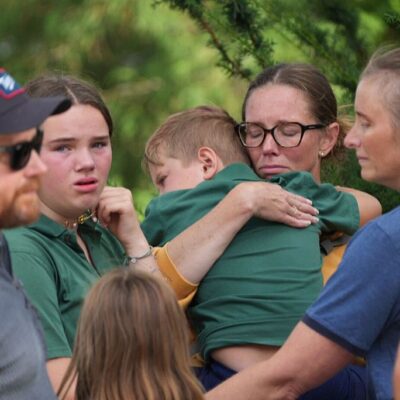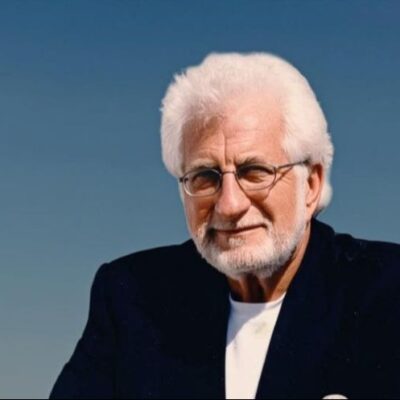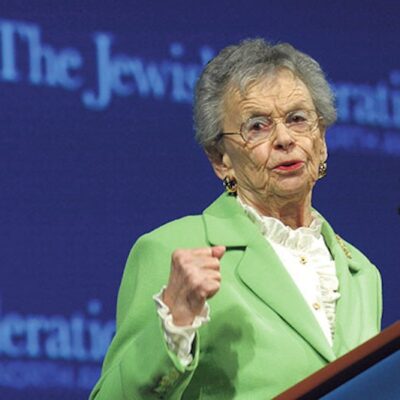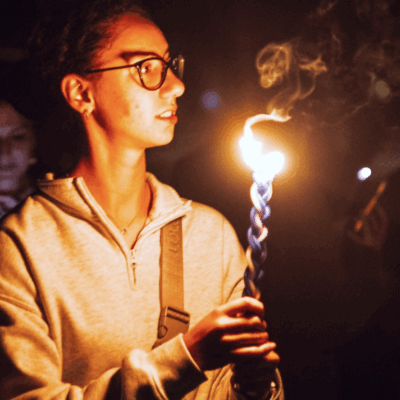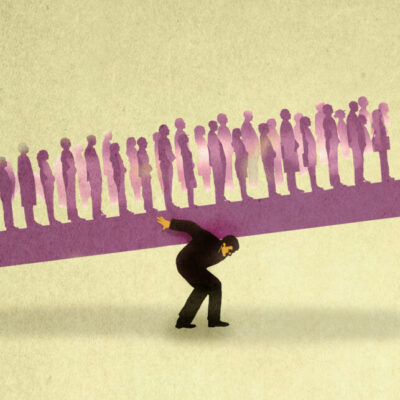Opinion
MAKE YOUR VOICE HEARD
In the discussion around taxes, we can’t let ‘the antisemitism tax’ be forgotten
Debate over taxes and tariffs has dominated the airwaves in this country lately, but there is a critical tax that requires further examination: the “antisemitism tax.”
After Oct. 7, Jewish communities across the country sprang into action to protect their institutions, ensuring that Jewish life could continue safely despite historic levels of antisemitism. As a result, however, many communities were forced to shoulder a heavy financial burden to subsidize added security costs — an unsustainable antisemitism tax. In fact, in the months following Oct. 7, Teach Coalition, the nonpublic school advocacy organization I represent, found that our member schools had to increase their security spending by nearly 50% to ensure the safety of their students.

John M. Chase/Getty Images
Illustrative. A school security vehicle from Fairfax County Public Schools in Virginia waits at an intersection.
In the months following Oct. 7, when security concerns for the Jewish community dominated the headlines, any news of vandalism, a bomb threat or an assault received full coverage, and passionate calls for change and government intervention swiftly followed from both ends of the political spectrum. Jewish communities nationwide rallied for additional security funding and resources; and our advocacy, propelled by the timeliness of the issue and the alarming headlines, was met with historic levels of security funding granted to Jewish institutions. Ultimately, over $310 million in state and local security funding was allocated across seven states. This included New York, which increased combined security funding from $70 million to $105 million — representing the largest state security allocation in the country.
Just over a year later, state budgets are once again being negotiated, and a reset button has been hit as state budgets across the board are being slashed. We as a community must again fight for critical security funding — a need that has unfortunately not dissipated with time.
In fact, Teach Coalition’s recent survey revisiting the question of security spending post-Oct. 7 paints a grim picture. Overall, security spending among 63 Teach Coalition member schools in New York, New Jersey, Pennsylvania and Florida increased a staggering 84% for the 2024-2025 school year, with these schools now spending $360 per student more on security than before Oct. 7. In New York, the schools reported having to spend 98% more on security over the last school year; in Florida, there has been a 70% increase. This is a cost that ultimately gets passed on to families in the form of security fees or increased tuition.
Unfortunately, this time around, time and a sense of urgency are no longer on our side.
We see this in places like Florida, where the governor has already proposed cutting the additional $20 million in security funding granted in last year’s budget, decreasing it to just $9 million. If this were to become reality, it would have devastating effects on our schools and the communities that support them. In Maryland, where $10.5 million in security funding was allocated last year, the Department of Legislative Services has recommended $2.5 million in cuts to a program instrumental in ensuring our students are properly protected while they learn. And even in places where funding is not under threat, we still have a long way to go to bridge the gap in the rising “antisemitism tax.”
So how do we ensure that the funding we need not only continues to reach our institutions, but matches the increasing need? The answer here lies in the voices of our communities.
Just as we did one year ago, we must sound the alarm on the ongoing threats we face — and also on the correlating antisemitism tax, which only continues to rise. With budgets currently being negotiated, the Jewish community must fight to maintain existing funding and increase security resources where possible. We must come together and say no to the antisemitism tax. We must let our elected leaders know that all schools should be safe and enriching learning environments, irrespective of where a parent chooses to send their child to school.
Dan Mitzner is the director of government affairs for Teach Coalition, the nonpublic school advocacy organization of the Orthodox Union.

